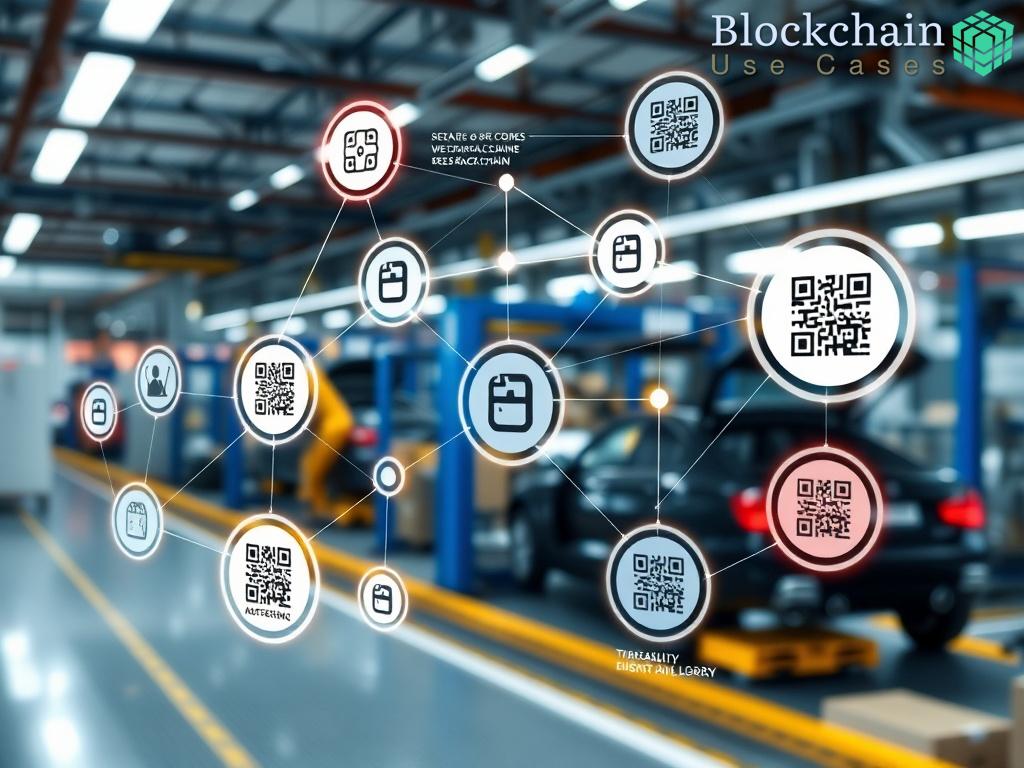Enhancing Traceability in Automotive Supply Chains
The automotive industry has long grappled with the complexities of supply chain management, where traceability plays a crucial role in ensuring product quality and compliance. As manufacturers seek to optimize their operations, blockchain technology emerges as a transformative force. By providing a decentralized ledger that records every transaction and movement of parts, blockchain enhances transparency and accountability within the supply chain.
With this technology, stakeholders can access real-time data regarding the origin and journey of each component. This capability not only helps in tracking defects and recalls but also fosters trust among suppliers, manufacturers, and consumers alike.
The integration of blockchain in automotive supply chains yields several significant advantages. These benefits can be categorized as follows:
- Enhanced Data Integrity: Blockchain’s immutable nature ensures that once data is recorded, it cannot be altered without consensus from all parties involved, thus reducing the risk of fraud and errors.
- Real-Time Monitoring: With blockchain, stakeholders can monitor the status of components in real-time, facilitating quicker responses to issues and maintaining operational efficiency.
- Improved Regulatory Compliance: Automated records on the blockchain can simplify compliance with industry regulations, making audits and inspections more straightforward.
- Increased Consumer Trust: By providing consumers with verifiable information about the provenance of automotive parts, manufacturers can enhance their brand reputation and customer loyalty.
| Feature | Traditional Methods | Blockchain Approach |
|---|---|---|
| Data Access | Limited to specific parties | Accessible to all authorized stakeholders |
| Fraud Prevention | Reactive measures | Proactive prevention through immutability |
| Recall Efficiency | Time-consuming tracking | Instantaneous identification of affected parts |
As the automotive industry continues to evolve, the potential of blockchain technology becomes increasingly apparent. The future of automotive supply chains may very well depend on collaborative ecosystems where all participants—manufacturers, suppliers, and consumers—leverage blockchain for improved traceability. By fostering such an environment, the industry can not only enhance operational efficiency but also drive innovation and sustainability.
In conclusion, the integration of blockchain into automotive supply chains represents a significant step towards achieving greater transparency and accountability. As the industry adapts to this new paradigm, the implications for product lifecycle management are profound, paving the way for a more resilient and trustworthy automotive landscape.
Optimizing Inventory Management through Blockchain
In an era where operational efficiency is paramount, the automotive industry is continuously exploring innovative solutions to streamline processes, particularly in inventory management. The advent of blockchain technology presents a remarkable opportunity to revolutionize how automotive manufacturers manage their inventory. By facilitating real-time data sharing and collaboration among various stakeholders, blockchain not only enhances visibility but also mitigates the risks associated with traditional inventory systems.
One of the most significant advantages of implementing blockchain in inventory management is the unprecedented level of visibility it provides. Traditional inventory management systems often suffer from delays in data updates, leading to discrepancies and inefficiencies. In contrast, blockchain offers a decentralized platform where all parties involved—from suppliers to manufacturers—can access real-time inventory data. This transparency allows for better forecasting and demand planning, reducing the instances of overstocking or stockouts.
Another key aspect of blockchain technology is the use of smart contracts that automate various inventory management processes. These self-executing contracts can trigger actions based on pre-defined conditions, such as automatically reordering parts when inventory levels fall below a certain threshold. This not only accelerates the procurement process but also minimizes human error and enhances accuracy in order fulfillment, ultimately leading to cost savings.
Below is a list summarizing the core benefits of utilizing blockchain for inventory management within the automotive supply chain:
- Enhanced Accuracy: Real-time updates ensure that inventory counts are precise and reflect actual stock levels.
- Reduction in Waste: Improved demand forecasting minimizes excess inventory, reducing waste and associated holding costs.
- Increased Agility: Quick access to inventory data allows for rapid responses to market changes and consumer demands.
- Cost Efficiency: Automation through smart contracts reduces labor costs and streamlines processes.
- Strengthened Collaboration: Shared access to inventory data fosters better collaboration and trust among supply chain partners.
As the automotive industry embraces blockchain technology, the potential to optimize inventory management becomes clearer. By enhancing visibility, automating processes, and facilitating collaboration, blockchain paves the way for a more efficient and responsive supply chain. As manufacturers leverage these capabilities, they can expect not only improved operational performance but also a competitive edge in a rapidly evolving market.
Facilitating Compliance and Regulatory Adherence
The automotive industry is subject to a myriad of regulations and standards designed to ensure safety, quality, and environmental sustainability. As compliance becomes increasingly complex, blockchain technology offers a robust solution to streamline adherence to these regulations. By creating a transparent and tamper-proof record of every transaction, blockchain not only simplifies compliance processes but also fosters a culture of accountability among stakeholders.
Streamlining Compliance Processes With the ability to record every step of a product’s lifecycle, blockchain technology significantly enhances the ability of automotive manufacturers to comply with industry regulations. Each component’s origin, manufacturing process, and movement through the supply chain can be tracked in real-time, creating an auditable trail. This capability is invaluable during audits, as it eliminates the need for extensive documentation and manual record-keeping. Moreover, the decentralized nature of blockchain ensures that all parties involved have access to the same information, thereby reducing discrepancies and fostering collaboration.
Furthermore, the use of smart contracts can automate compliance checks by triggering alerts when certain conditions are not met. For instance, if a part does not meet regulatory standards, a smart contract can automatically halt the production process, allowing for immediate corrective actions. This proactive approach not only minimizes risks but also enhances overall operational efficiency.
| Aspect | Traditional Compliance Methods | Blockchain Approach |
|---|---|---|
| Data Verification | Manual and time-consuming | Automated and instantaneous |
| Audit Trails | Fragmented and prone to errors | Comprehensive and immutable |
| Stakeholder Access | Limited to specific parties | Accessible to all authorized entities |
Enhancing Regulatory Reporting In addition to streamlining compliance processes, blockchain technology plays a pivotal role in enhancing regulatory reporting. By providing a single source of truth, it simplifies the data collection required for compliance reports. Automotive manufacturers can generate accurate reports on demand, ensuring that they remain compliant with evolving regulations without incurring delays or penalties. This capability is particularly critical in an industry where regulatory requirements can change rapidly, necessitating agile responses from manufacturers.
In conclusion, the integration of blockchain technology into automotive supply chains is not merely a trend but a transformative shift that enhances compliance and regulatory adherence. By offering unprecedented visibility, automation, and reliability, blockchain allows stakeholders to navigate the complexities of regulatory frameworks with confidence. As the automotive landscape continues to evolve, the role of blockchain in maintaining compliance will undoubtedly become more pronounced, paving the way for a more accountable and transparent industry.
Improving Collaboration Among Supply Chain Stakeholders
In the dynamic landscape of the automotive industry, fostering effective collaboration among supply chain stakeholders is crucial for navigating complexities and driving innovation. As manufacturers embrace blockchain technology, a paradigm shift occurs, enabling seamless interactions and information sharing across the entire supply chain. This collaborative environment not only enhances operational efficiency but also cultivates a sense of community and shared responsibility among all parties involved.
One of the most transformative aspects of blockchain is its ability to facilitate real-time data sharing. Unlike traditional systems that often lead to siloed information, blockchain provides a unified platform where stakeholders can access critical data instantly. This transparency ensures that all parties, from suppliers and manufacturers to distributors and retailers, are on the same page. The availability of accurate and up-to-date information significantly reduces the chances of miscommunication, which often leads to costly delays.
Blockchain’s immutable ledger plays a pivotal role in establishing trust among supply chain partners. By providing a tamper-proof record of every transaction, blockchain instills confidence that the data being shared is reliable. This assurance fosters accountability, encouraging stakeholders to engage in more open and honest dialogues. Moreover, the decentralized nature of blockchain means that all authorized participants have equal access to information, further strengthening the bonds of collaboration. In this environment, issues such as discrepancies in quality, delivery delays, or compliance violations can be addressed proactively, rather than reactively, enhancing overall supply chain resilience.
As the automotive industry evolves, the emphasis on creating a collaborative ecosystem becomes more apparent. Blockchain technology acts as a catalyst for this transformation, enabling stakeholders to work together towards common goals, such as sustainability and innovation. By leveraging shared insights and collective expertise, manufacturers can streamline processes, reduce redundancies, and ultimately deliver superior products to consumers. The integration of smart contracts further enhances collaboration by automating agreements and ensuring that all parties fulfill their obligations, thereby minimizing disputes and fostering a more harmonious working relationship.
Mitigating Risks in Product Lifecycle Management
The automotive industry is characterized by its complexity, with numerous stakeholders involved in the product lifecycle from design to delivery. In this intricate web, risks abound at every stage, ranging from supply chain disruptions to compliance failures. However, the integration of blockchain technology is emerging as a powerful tool for mitigating these risks, enhancing the resilience of automotive supply chains.
Enhanced Risk Visibility is one of the most significant benefits that blockchain brings to product lifecycle management. By providing a transparent and immutable record of every transaction and movement of components, blockchain allows stakeholders to identify potential risks early in the process. This enhanced visibility means that manufacturers can respond swiftly to issues, such as delays in delivery or quality concerns, thereby reducing the likelihood of costly disruptions.
Furthermore, the concept of real-time monitoring through blockchain enables manufacturers to track the status of their products at every stage of the lifecycle. This capability is crucial in identifying anomalies or deviations from the expected performance, which can signal underlying risks. For example, if a supplier fails to meet quality standards, stakeholders can be alerted immediately, prompting timely corrective actions, which ultimately safeguards the integrity of the product.
Automating Compliance Measures is another area where blockchain excels in risk mitigation. With regulatory requirements becoming increasingly stringent, the need for robust compliance mechanisms has never been more critical. Blockchain technology facilitates automated compliance checks by leveraging smart contracts that can enforce rules and trigger alerts when standards are not met. This proactive approach not only minimizes the risks associated with non-compliance but also instills confidence among consumers and regulatory bodies alike.
The effectiveness of blockchain in managing risks is also underscored by its ability to strengthen supply chain partnerships. The decentralized nature of the technology fosters a culture of trust and transparency, allowing all parties to share critical information without fear of data manipulation. This collaborative environment enables stakeholders to work together more effectively, addressing potential issues before they escalate. In a landscape where collaboration is key to success, blockchain serves as an essential foundation for building robust partnerships.





